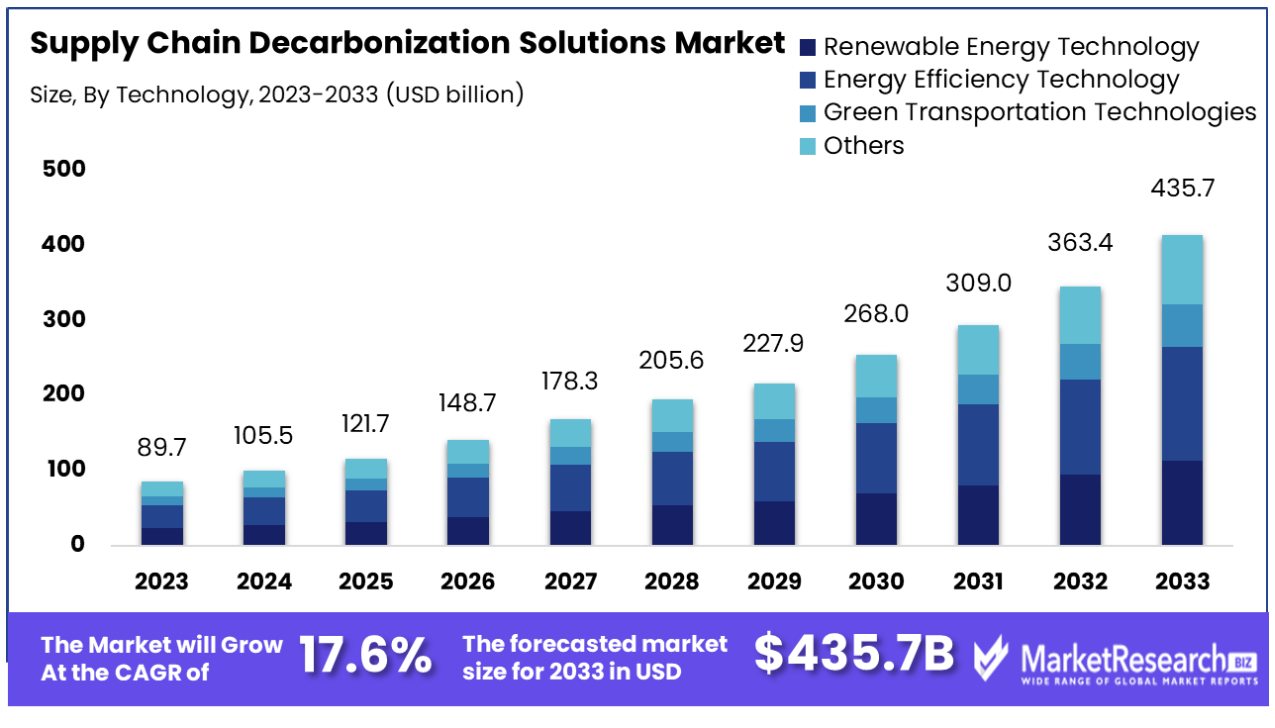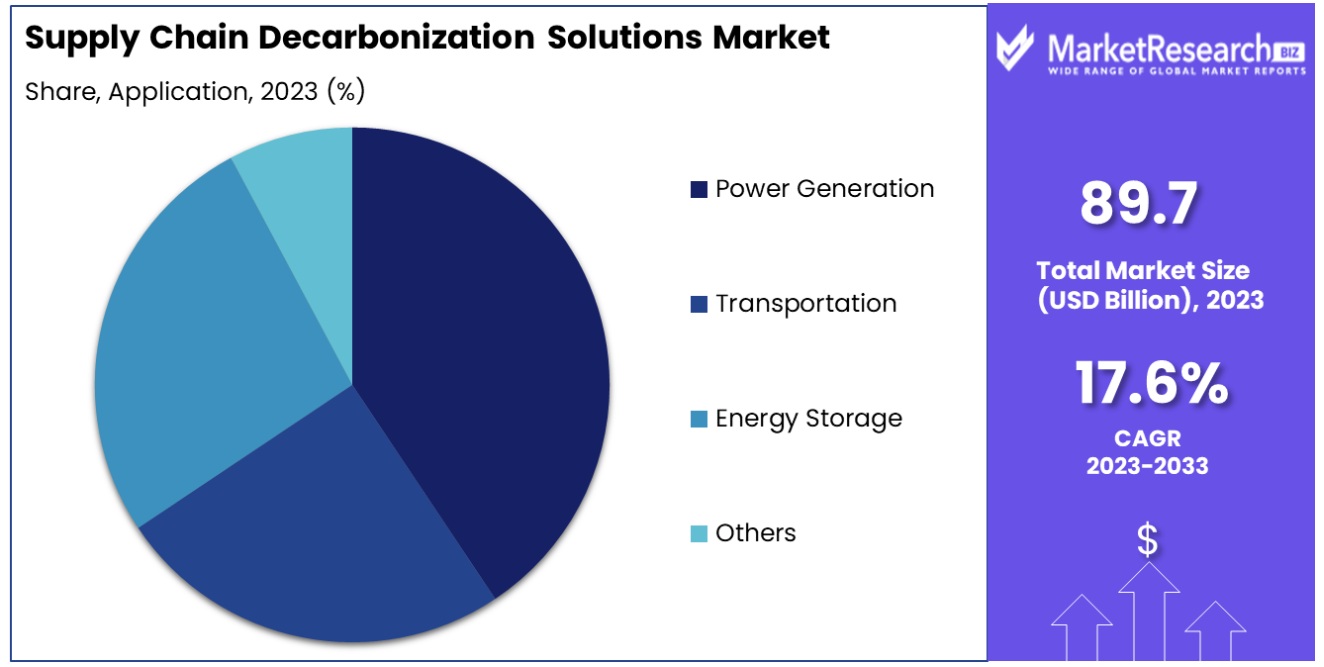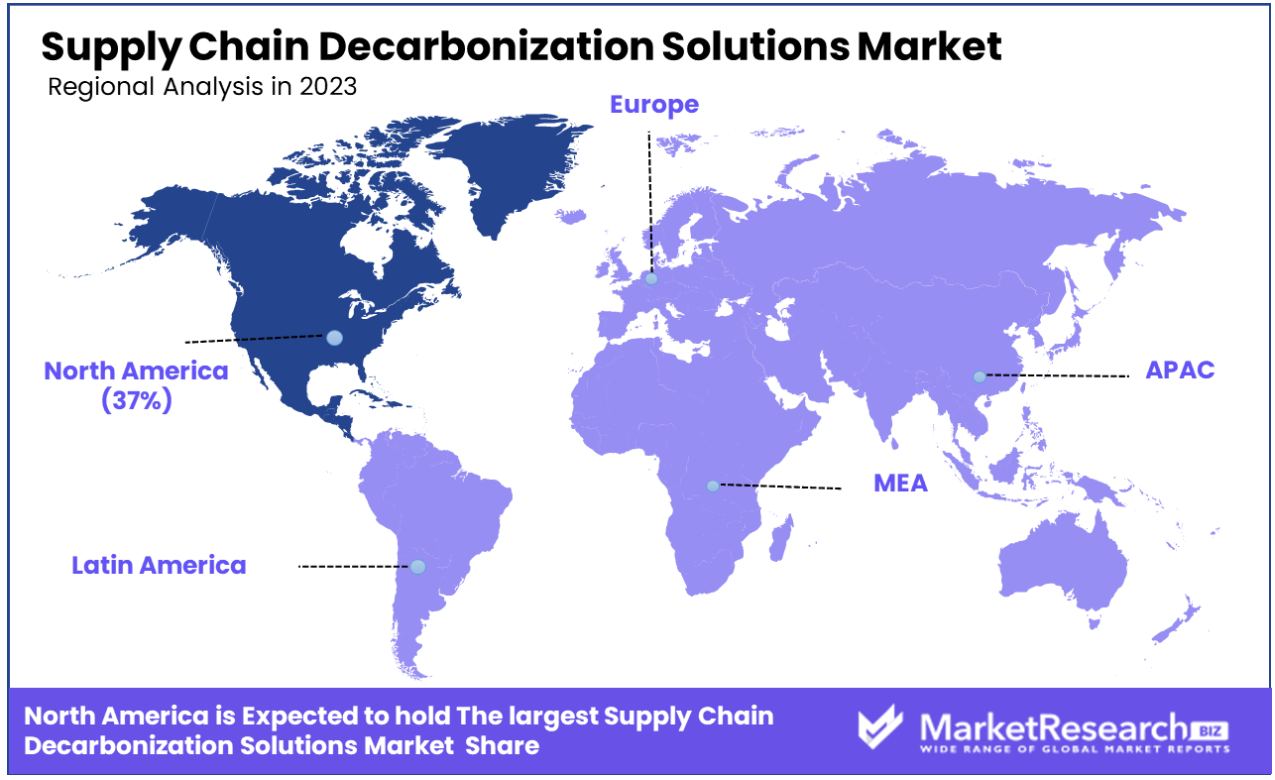
Supply Chain Decarbonization Solutions Market By Technology(Renewable Energy Technology - Dominated Segment, Energy Efficiency Technology, Green Transportation Technologies, Others), By Application(Power Generation - Dominated Segment, Transportation, Energy Storage, Others) By Region And Companies - Industry Segment Outlook, Market Assessment, Competition Scenario, Trends, And Forecast 2024-2033
-
43508
-
Feb 2022
-
185
-
-
This report was compiled by Correspondence Linkedin | Detailed Market research Methodology Our methodology involves a mix of primary research, including interviews with leading mental health experts, and secondary research from reputable medical journals and databases. View Detailed Methodology Page
-
Report Overview
The Supply Chain Decarbonization Solutions Market was valued at USD 89.7 billion in 2023, It is expected to reach USD 435.7 billion by 2033, with a CAGR of 17.6% during the forecast period from 2024 to 2033.

The record high in global carbon emissions, reaching over 40 billion tons in 2023, accentuates the ongoing challenge and urgency of decarbonization. This scenario creates a substantial demand for supply chain decarbonization solutions. Businesses and governments are increasingly compelled to seek innovative solutions to reduce their carbon footprint, driving the market for technologies and services that can effectively lower emissions in supply chains.
Highlights that over 90% of the environmental impact of the supply chain is negative, accounting for more than 80% of greenhouse gas emissions and more than 90% of the land, water, biodiversity, and geological resources. The significant negative environmental impact of supply chains spotlights a critical area for improvement. With supply chains accounting for a major portion of global greenhouse gas emissions, there is a growing necessity for strategies and solutions that minimize environmental damage while maintaining organizational growth.
To tackle this issue several industries and companies are working actively to mitigate the effects. For instance, the collaboration between Schneider Electric and Women Action Sustainability (WAS) on decarbonizing supply chains underlines the pivotal role of supply chain partners in achieving carbon neutrality. This is particularly relevant for SMEs, which may need additional support and resources to integrate sustainable practices into their operations, thereby expanding the market for decarbonization services and technologies.
Moreover, the semiconductor industry's move towards sustainability, led by Schneider Electric's Catalyze program and supported by tech giants like Google and HP, indicates a broader industrial trend towards greener practices. This shift suggests an expanding market for renewable energy adoption and carbon footprint reduction strategies across various industries, including IT and manufacturing.
There has been a widespread adoption of various frameworks which is expected to drive the demand for solutions that can accurately measure, report, and reduce emissions across different industries, underscoring a growing market for advanced carbon accounting and management tools. For instance, the development of the Coalition on Materials Emissions Transparency (COMET) Framework by UN Climate Change and COMET, aiming for a standardized carbon accounting method, addresses a significant gap in current emissions reporting. This initiative, by providing a unified approach to carbon accounting, enhances the transparency and accountability of supply chain emissions.
The industries are now observing broader shifts towards more sustainable business practices and the utilization of market-based mechanisms to support environmental objectives. DuPont's substantial reduction in operational emissions at its Healthcare Industrial Materials Site in Michigan through the purchase of Renewable Energy Credits (RECs) in October 2023, illustrates a key strategy in supply chain decarbonization. This approach, part of DuPont's commitment to annual REC purchases, highlights the growing trend of companies investing in renewable energy solutions to offset their carbon footprint.
Driving Factors
Corporate Focus on Scope-3 Emissions Fuels Decarbonization Solutions Market
Companies are increasingly focusing on reducing their scope-3 emissions, which include supply chain emissions, to meet their decarbonization targets. This shift is largely driven by the recognition that a significant portion of a company's carbon footprint lies within its supply chain operations. As businesses commit to broader climate goals, addressing these indirect emissions becomes crucial. This focus is propelling the demand for supply chain decarbonization solutions, as companies seek innovative strategies and technologies to measure, analyze, and reduce emissions associated with their supply chain activities. The trend of corporate responsibility towards comprehensive decarbonization suggests sustained growth in the market for these solutions.
Consumer Demand for Sustainability Spurs Supply Chain Decarbonization
Growing customer demand for sustainable practices is pushing businesses to reduce their carbon footprint, including supply chain emissions. Consumers are increasingly aware of and concerned about the environmental impact of the products they purchase, leading to a preference for companies with sustainable practices. This consumer-driven shift is compelling businesses to adopt supply chain decarbonization solutions to maintain market competitiveness and brand reputation. As this eco-conscious consumer behavior continues to rise, the market for supply chain decarbonization solutions is expected to grow, supported by businesses striving to align with customer values and sustainability expectations.
Resilient, Decarbonized Supply Chains Attract Businesses
Decarbonized supply chains are more resilient to disruptions, making them an attractive option for businesses. In an era where supply chain vulnerabilities have been exposed by global events like pandemics and climate-related disasters, resilience has become a key priority. Decarbonized supply chains often involve diversification of sources, localization, and sustainable practices that contribute to greater resilience. This shift towards resilient, low-carbon supply chains is not just an environmental choice but also a strategic business decision. The drive towards resilience in supply chains is therefore expected to further fuel the market for decarbonization solutions, as businesses seek to mitigate risk and ensure continuity in a changing global environment.
Restraining Factors
Overreliance on Traditional Practices Limits Progress in Supply Chain Decarbonization
The supply chain decarbonization solutions market is hindered by an overreliance on traditional supply chain practices and a lack of innovation in decarbonization efforts. Many industries continue to follow established supply chain models that prioritize cost and efficiency over environmental impact. This reliance on conventional methods often leads to resistance against adopting new, greener practices. Additionally, the pace of innovation in decarbonization technologies and strategies is not keeping up with the urgency required to reduce emissions significantly. This slow adoption of innovative solutions limits the potential for substantial progress in reducing supply chain carbon footprints, thereby restraining market growth in this sector.
Uncertainty Around Regulations Creates Challenges in Decarbonization Initiatives
Uncertainty surrounding future regulations and policies related to carbon emissions poses significant challenges for companies in planning and implementing supply chain decarbonization initiatives. Businesses often face difficulties in anticipating the nature of future environmental regulations, making it challenging to strategize long-term decarbonization plans. This regulatory uncertainty can lead to hesitancy in investing in substantial changes or adopting new technologies for fear of future policies rendering these investments obsolete. Companies may adopt a 'wait and see' approach, delaying action until regulatory landscapes become clearer. This uncertainty hampers proactive efforts in supply chain decarbonization, limiting the market's ability to advance and innovate in response to evolving environmental standards.
Supply Chain Decarbonization Solutions Market Segmentation Analysis
By Technology Analysis
Renewable Energy Technology holds an overwhelming 47.4% market share in the Supply Chain Decarbonization Solutions Market. This sector's growing appeal can be traced to global efforts to reduce carbon emissions and transition toward renewable energy sources such as solar, wind, hydroelectricity, and biomass technology which has become more widely adopted across supply chains to lessen reliance on fossil fuels. Companies are turning to these technologies for powering their operations, including manufacturing plants and distribution centers, helping reduce carbon footprint. Renewable energy's increasing popularity can also be explained by economic considerations; renewable technologies continue to become cost-competitive with traditional sources, while adoption is further promoted through regulatory incentives and rising consumer interest in eco-friendly practices.
Energy Efficiency Technology encompasses innovations designed to reduce energy consumption, such as LED lighting, high-efficiency heating and cooling systems, smart energy management systems, and electric vehicles. Energy efficiency innovations play a pivotal role in decarbonizing supply chains by directly lowering operational energy needs; such as electric vehicles, hydrogen fuel cell technology, and biofuels which directly contribute towards reduced logistics emissions - one major source of supply chain emissions. Other related innovations such as carbon capture storage as well as materials with lower environmental impacts may also fall within this field of research.
By Application Analysis
Power generation is the most significant application in the Supply Chain Decarbonization Solutions Market, commanding a 61% share. This segment's dominance reflects the vital role of clean energy generation in achieving overall supply chain decarbonization. Companies are investing in renewable energy installations and entering power purchase agreements (PPAs) with suppliers to source clean energy, which reduces the carbon intensity of the power supply. This shift is both responsive to environmental concerns as well as economically beneficial, as renewables become more cost-effective.

Decarbonizing transportation within the supply chain involves adopting low-emission vehicles and optimizing logistics networks to reduce fuel consumption and emissions. As renewable energy sources increase, energy storage solutions become essential to manage the intermittent nature of these sources and ensure a reliable energy supply. The other segments include various applications like sustainable manufacturing processes, waste management, and eco-friendly material sourcing, which contribute to reducing the overall carbon footprint of supply chains.
Key Market Segments
By Technology
- Renewable Energy Technology
- Energy Efficiency Technology
- Green Transportation Technologies
- Others
By Application
- Power Generation
- Transportation
- Energy Storage
- Others
Supply Chain Decarbonization Solutions Market Regional Analysis
North America Dominates with 37% Market Share in Supply Chain Decarbonization Solutions
North America’s 37% share in the Supply Chain Decarbonization Solutions Market is driven by the region's growing commitment to sustainability and reducing carbon emissions. The United States and Canada, home to numerous multinational corporations, are increasingly under pressure from stakeholders and regulatory bodies to reduce their carbon footprints. This has created an increase in demand for solutions that decarbonize supply chains; technological innovations as well as leading supply chain management firms play a vital role in developing and implementing decarbonization strategies in these regions.

The market dynamics in North America are influenced by the increasing awareness of climate change and the adoption of corporate social responsibility practices. The shift towards renewable energy sources, the integration of sustainable practices in logistics and manufacturing, and the use of data analytics for carbon footprint tracking are key trends. Furthermore, government initiatives and policies promoting environmental sustainability encourage businesses to invest in decarbonization solutions.
Europe is Pioneering in Sustainability and Regulatory Compliance
Europe’s supply chain decarbonization solutions market is driven by the region's pioneering role in sustainability and stringent regulatory compliance. European countries have set ambitious climate goals, with strong policies encouraging businesses to adopt greener supply chain practices. The region's focus on environmental accountability and the adoption of advanced technologies in supply chain management support the market's growth.
Asia-Pacific's Rapid Growth with Increasing Environmental Awareness
Asia-Pacific's supply chain decarbonization solutions market is experiencing rapid growth, fueled by increasing environmental awareness and regulatory pressures. Countries like China and Japan are actively investing in green initiatives and technologies to reduce their carbon emissions. The region's expanding industrial sector and the shift towards sustainable practices in manufacturing and logistics contribute to the market's potential growth.
Key Regions and Countries
North America
- The US
- Canada
- Rest of North America
Europe
- Germany
- France
- The UK
- Spain
- Netherlands
- Russia
- Italy
- Rest of Europe
Asia-Pacific
- China
- Japan
- Singapore
- Thailand
- South Korea
- Vietnam
- India
- New Zealand
- Rest of Asia Pacific
Latin America
- Mexico
- Brazil
- Rest of Latin America
Middle East & Africa
- Saudi Arabia
- South Africa
- UAE
- Rest of the Middle East & Africa
Supply Chain Decarbonization Solutions Market Key Player Analysis
In the Supply Chain Decarbonization Solutions Market, a crucial sector for achieving global sustainability goals, the companies listed are key players in driving environmental change within supply chains. Greenhouse Gas Protocol provides essential frameworks and standards for measuring and managing emissions, setting the foundation for corporate sustainability efforts.
Schneider Electric and Siemens Energy, as leaders in energy management and technology, are pivotal in offering solutions that reduce energy consumption and emissions in supply chains, demonstrating the industry's shift towards energy-efficient operations. Zeigo and ENGIE Impact, with their focus on renewable energy and sustainability consulting, play crucial roles in aiding businesses to transition towards greener energy sources and strategies.
Ryestrategy and Aioneers GmbH, specializing in sustainability and supply chain consulting, contribute significantly to the market by providing strategies and tools to optimize supply chain operations for lower carbon footprints. DHL Group and A.P. Moller-Maersk, leading logistics and shipping companies, underscore the importance of implementing sustainable practices in transportation and logistics, a major component of supply chain emissions.
Overall, the Supply Chain Decarbonization Solutions Market is marked by a blend of strategic consultancy, technological innovation, and implementation of sustainable practices, with each company playing a distinct role in helping businesses reduce their environmental impact and move towards a more sustainable future.
Market Key Players
- Greenhouse Gas Protocol
- Schneider Electric
- Zeigo
- Siemens Energy
- ENGIE Impact
- Ryestrategy
- DHL Group
- A.P. Moller - Maersk
- Aioneers GmbH
- STX Group
Recent Development
In May 2023 APM Terminals Bahrain the operator of Khalifa Bin Salman Port officially announced the beginning of a pioneering solar power project that is estimated to cost BHD3.8 million (USD 10 million) and will enable the port to become energy-separate by 2023. When this project is completed, the terminal will cut the carbon footprint by up to 65% while providing a sustainable and reliable power source, thereby making Khalifa Bin Salman Port the first fully self-sufficient seaport. When the solar installation project, APM Terminals Bahrain will have installed 20 solar photovoltaic panels 20,000 that are capable of producing 18.5 Gigawatts of electricity per year.
In May 2023 Dassault Systemes and Envision Digital established a collaboration to enhance the industrial Decarbonization efficiency and sustainable energy options to speed up industrial decarbonization. The two companies will talk about how the interplay between their technologies - namely, Envision Digital's EnOS digital decarbonization technology and Dassault Systemes' 3DEXPERIENCE platform allows the virtual twin experience for big assets in manufacturing, engineering operations, and other different industries.
Report Scope
Report Features Description Market Value (2023) USD 89.7 Billion Forecast Revenue (2033) USD 435.7 Billion CAGR (2024-2032) 17.6% Base Year for Estimation 2023 Historic Period 2016-2023 Forecast Period 2024-2033 Report Coverage Revenue Forecast, Market Dynamics, COVID-19 Impact, Competitive Landscape, Recent Developments Segments Covered By Technology(Renewable Energy Technology, Energy Efficiency Technology, Green Transportation Technologies, Others), By Application(Power Generation, Transportation, Energy Storage, Others) Regional Analysis North America - The US, Canada, Rest of North America, Europe - Germany, France, The UK, Spain, Italy, Russia, Netherlands, Rest of Europe, Asia-Pacific - China, Japan, South Korea, India, New Zealand, Singapore, Thailand, Vietnam, Rest of Asia Pacific, Latin America - Brazil, Mexico, Rest of Latin America, Middle East & Africa - South Africa, Saudi Arabia, UAE, Rest of Middle East & Africa Competitive Landscape Greenhouse Gas Protocol, Schneider Electric, Zeigo, Siemens Energy, ENGIE Impact, Ryestrategy, DHL Group, A.P. Moller - Maersk, Aioneers GmbH, STX Group Customization Scope Customization for segments, region/country-level will be provided. Moreover, additional customization can be done based on the requirements. Purchase Options We have three licenses to opt for Single User License, Multi-User License (Up to 5 Users), Corporate Use License (Unlimited User and Printable PDF) -
-




